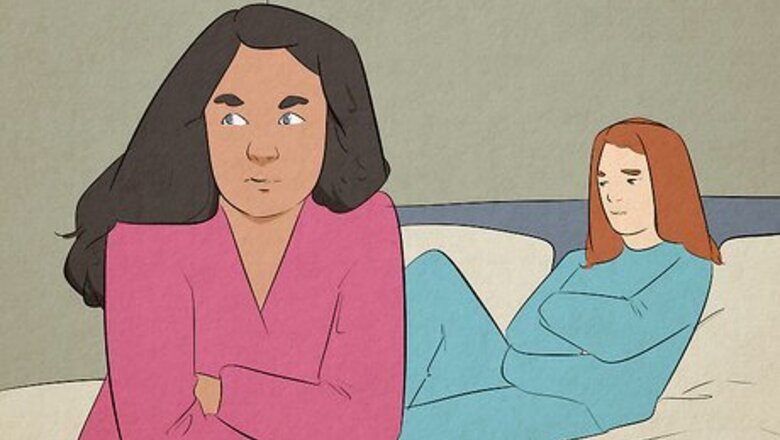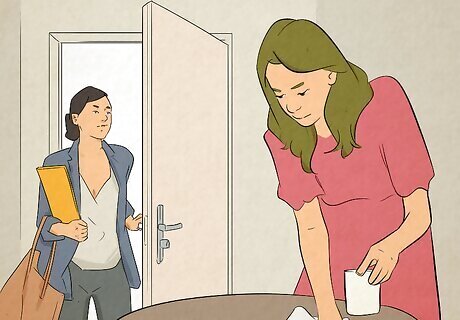
views
What is lesbian bed death?

Lesbian bed death refers to the supposed decline in sexual activity in long-term lesbian relationships. Lesbian bed death is a concept that suggests lesbians in long-term, committed relationships have less sex than other types of couples. Some define it as a drop-off in sexual activity that occurs two years into a long-term lesbian relationship. These days, most people consider lesbian bed death to be a myth, as most relationships, regardless of sexuality, experience drops in physical intimacy now and then, especially in long-term relationships.
Potential Causes of Lesbian Bed Death

Hormones Lesbian relationships that consist of two cisgender women may have to deal with more fluctuating hormones than other couples. Both women will likely have a menstrual cycle and later go through menopause. Their hormones may influence their libidos differently, which could lead to a drop in sex drive for one or both partners.

Life getting in the way This goes for all couples, regardless of sexual orientation. Perhaps a couple works different schedules so they rarely get to spend time together. Even if they see each other regularly, they may have kids to take care of or important errands to run. By the time they’re finished with the day, they may be too stressed or tired for physical intimacy. Couples may also be experiencing life transitions, like job loss, financial issues, or childbirth, during which it’s normal for sexual desire to decrease as they focus on reestablishing balance.

Health issues If one or both people in a couple are dealing with health concerns, this could impact their desire or ability to have sex. Some medical conditions, such as diabetes, cancer, and heart disease, are known to reduce libido, while other conditions, like endometriosis, may make sex difficult, painful, or impossible. Couples may also experience mental health issues, like depression or anxiety, that are linked to a decline in sexual desire and arousal.

Mismatched libidos or sexual interests Even when a couple is compatible in other aspects of their lives, they may not always be sexually compatible. Couples may have different sexual needs or turn-ons, which can lead to a decrease in sex, especially if they don’t communicate their wants and needs.

Relationship issues If a couple isn’t happy in their relationship, it frequently affects how much they enjoy and want to have sex. One or both people may feel alone in the relationship, or the couple may be going through challenges regarding infidelity or other betrayals. If they fail to communicate and trust their partner, they may feel emotionally (and therefore physically) detached from the relationship.
Lesbian Bed Death Origins
Sociologist Pepper Schwartz is credited with coining the term in the 1980s. The concept of lesbian bed death is based on 1983 research by sociologist Pepper Schwartz and social psychologist Philip Blumstein. The research was published in American Couples: Money, Work, Sex, and found that lesbian couples reported lower numbers when asked, “About how often during the last year have you and your partner had sex relations?” The results found that only about ⅓ of lesbians in relationships of 2 years or longer had sex once a week or more, and 47% of lesbians in long-term relationships had sex once a month or less. In comparison, only 15% of married heterosexual couples claimed to have sex once a week or less. Schwartz and Blumstein found this information by conducting a survey on American relationships. Initially, 12,000 couples, including 788 lesbian couples, filled out the questionnaire, then 300 couples in Seattle, San Francisco, and New York were selected for more in-depth interviews.
Is lesbian bed death a myth?

Most agree that lesbian bed death isn’t real. Schwartz and Blumstein’s research was only supported by anecdotal evidence and didn’t capture the full range of human sexuality, as it focused on heteronormative standards of sex and intimacy. Newer studies have shown that lesbians tend to report equal or greater sexual satisfaction than their heterosexual counterparts. Additionally, almost all couples, regardless of sexuality, experience a decrease in sexual activity in long-term relationships. It’s completely normal and can be increased through strong communication. Sexual satisfaction is also more about quality than quantity, so even if couples do see a decrease in sex over time, it doesn’t necessarily mean they don’t have a good sex life.
Keeping Physical Intimacy Alive

Talk to your partner about your needs. According to Moore, “Having an honest conversation about what the two of you are feeling can be a fast track to unlocking the intimacy and passion you once felt.” Everyone has a different libido, so sex may be more important to some people than others. If you’re going through a sexual drought, talk to your partner. Discuss how frequently you’d both like to have sex, your turn-ons and turn-offs, and any boundaries or limits you have. Opening communication is the first step to having a satisfying sex life. Never force yourself or your partner to do anything you’re uncomfortable with. All aspects of sex should be enthusiastic. Consent is key! EXPERT TIP Nicole Moore Nicole Moore Love & Relationship Coach Nicole Moore is a Love and Relationship Coach and the Founder and CEO of Love Works Method, a private coaching and digital course service for women looking to find the right partner. With over a decade of experience, she specializes in body language and helping others take control of their dating life, attract a partner, and build a strong relationship. Nicole has been featured in numerous publications such as Cosmopolitan, Forbes, and USA Today. She also hosts Love Works with Nicole Moore, a podcast for modern women wanting love, dating, and relationship advice. Nicole holds a BA in Public Relations and Spanish from Syracuse University and a Certificate in Personal Coaching from New York University. Nicole Moore Nicole Moore Love & Relationship Coach Check in with your emotions. Passionate sex usually happens when we have positive feelings toward our partner. So, take a look at what’s going on under the surface emotionally, and notice if there’s any resentment or disappointment toward your partner.

Try new things in the bedroom. Don’t be afraid to spice up your sex life. If the same positions and toys just aren’t cutting it anymore, try something new! Consider whether there are any kinks or fetishes you want to try, or see if roleplaying with sexy outfits is your thing. You and your partner may discover mutual preferences for certain things.

Focus on emotional intimacy. Often, couples experience a drop in physical intimacy when there’s a lack of emotional intimacy. Communicate openly and honestly with your partner about all aspects of your life, not just your sex life. Actively listen to what each other has to say, validate each other’s feelings, and support each other’s goals. Being vulnerable with your partner builds trust, which is important not just for your sex life but your relationship in general. Spend time together. Everyone needs alone time now and then, but make sure you aren’t neglecting your partner. Surprise each other with romantic dates and gifts. Make sure your partner feels loved and appreciated. Moore recommends, “Remember how the connection used to feel and take small actions every day to increase the connection between the two of you. Give your partner a longer kiss in the morning than you usually do before you both head off to work. Send your partner a flirty text in the middle of the day to let them know you were reminiscing about the wild times you two have had and [that] it made you smile.”

Give each other physical affection outside of the bedroom. There are plenty of ways to express physical affection other than sex. Give your partner plenty of hugs and kisses, and find excuses to touch them throughout the day, like holding their hand or brushing their arm when you walk by. You can even offer to give them a massage! Touching your partner increases oxytocin, which can improve your mood, and is an important part of foreplay.

Schedule sex. Scheduling sex may sound unsexy at first, but it can be a great way to boost physical intimacy if you and your partner live busy lives. Making time for sex ensures that it’s a priority. Planning sex can even increase anticipation and excitement, as you know you have something to look forward to. In some cases, scheduling sex even helps couples have sex spontaneously because they feel a renewed connection with their partner.

See a sex therapist. If you’ve tried to increase physical intimacy with no success, it may be time to see a sex therapist. According to Novak, “Sex therapists are much more open to talking about sex than couples therapists.” Sex therapists can help you work through the mental and emotional aspects of sex-related issues and provide professional suggestions on how to improve your sex life. Sex therapists prioritize your privacy and provide a safe, judgment-free zone to talk about any issues you’re having with your sex life. When choosing a sex therapist, Novak emphasizes, “The initial consultation can be really huge. Give a little baby snippet [of your situation] to hear how they would handle the situation or help you through it. How are they talking about it? Are they talking about it in a way that makes you feel better? That’s a really big thing to look out for.” If seeing a sex therapist still doesn’t help, consider whether your relationship is fulfilling in other aspects. If you’re not happy, it may be time to talk to a couple’s counselor or to take a break from the relationship.
Final Takeaways
It’s okay if you and your partner are experiencing a dip in physical intimacy. All couples, regardless of sexuality, go through phases where they aren’t as sexually active. It’s normal and nothing to be ashamed of. Everyone has different libidos, so if you and your partner are happy with your level of intimacy, don’t feel pressured to change it. If you both agree you want to have sex more often, work on communicating your wants and needs, making time for each other, and experimenting in the bedroom.


















Comments
0 comment